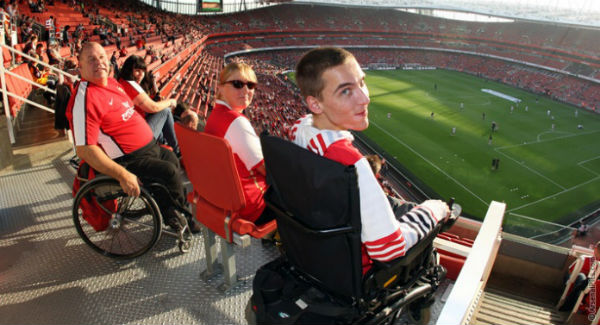
Legal & Planning
In general, facilities like amusement parks and recreational boating are required to have accessible routes to loading and unloading areas as well as wheelchair accessible seating (or seating to accommodate a transfer from a wheelchair as well as a mechanism for transfer) based on design of the facility.
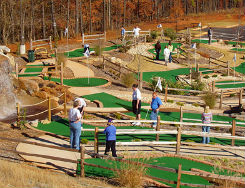 For facilities like mini-golf courses, the rules require that at least 50% of the holes be accessible and that those holes should be consecutive with accessible entrances and exits.
For public golf courses, golf carts and accessible routes must be available. It is important to know that these rules may not apply to private clubs.
For facilities like mini-golf courses, the rules require that at least 50% of the holes be accessible and that those holes should be consecutive with accessible entrances and exits.
For public golf courses, golf carts and accessible routes must be available. It is important to know that these rules may not apply to private clubs.
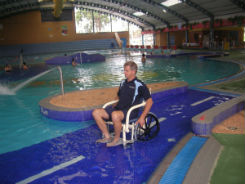 For swimming pools, wading pools and spas, at least two accessible means of entry need to be provided (for pools under 300 feet long, only one entry needs to be provided). This includes the option to use swimming pool lifts, sloped entries, transfer walls, transfer systems or pool stairs. For wave pools, lazy rivers, and sand bottom pools, only one accessible entrance needs to be provided.
For swimming pools, wading pools and spas, at least two accessible means of entry need to be provided (for pools under 300 feet long, only one entry needs to be provided). This includes the option to use swimming pool lifts, sloped entries, transfer walls, transfer systems or pool stairs. For wave pools, lazy rivers, and sand bottom pools, only one accessible entrance needs to be provided.
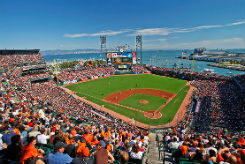 Wheelchair accessible seating is required for at least 1% of the total seats in a stadium or arena. Wheelchair accessible seating also must be integrated into the regular seating plan and should have comparable views to the field or stage (this includes providing an area where someone in a wheelchair can reasonably see over spectators who might be standing).
In addition to the wheelchair accessible seating, accessible restrooms and concession areas, at least 1% of the fixed seats must have no armrest (or a removable armrest) for those with mobility issues who do not wish to use the wheelchair accessible seating area.
Wheelchair accessible seating is required for at least 1% of the total seats in a stadium or arena. Wheelchair accessible seating also must be integrated into the regular seating plan and should have comparable views to the field or stage (this includes providing an area where someone in a wheelchair can reasonably see over spectators who might be standing).
In addition to the wheelchair accessible seating, accessible restrooms and concession areas, at least 1% of the fixed seats must have no armrest (or a removable armrest) for those with mobility issues who do not wish to use the wheelchair accessible seating area.
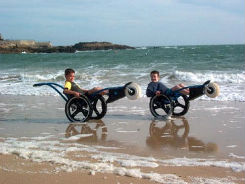 Outdoor areas include places for camping, picnics, trails, and beach access routes. In general and when feasible, outdoor areas need to be accessible. At least 50% of picnic tables, fire rings, grills, and benches in an area are required to be accessible. However, of those 50%, only 40% of those areas are required to have an accessible route. There are exceptions when the trail or beach access has natural obstacles that make it impossible to comply with the regulations.
Outdoor areas include places for camping, picnics, trails, and beach access routes. In general and when feasible, outdoor areas need to be accessible. At least 50% of picnic tables, fire rings, grills, and benches in an area are required to be accessible. However, of those 50%, only 40% of those areas are required to have an accessible route. There are exceptions when the trail or beach access has natural obstacles that make it impossible to comply with the regulations.
Water slides are exempt from the guidelines as it was thought that creating ramps or elevator lifts to the tops of large slides would be too expensive. However, the guidelines encourage designers of smaller water slides to make them accessible when possible.
Mobile or portable amusement rides, such as those seen at traveling carnivals and state fairs are generally exempt from the guidelines.
What You Need to Know About Accessibility At Public Venues
Summer is often a time for carnivals, amusement parks, going to the beach, and other fun activities. For people with disabilities, accessing these activities can be challenging. This article presents the basics of what you need to know with respect to disability accommodations in public places like amusement parks, beaches, parks, boating facilities, fishing piers, public golf courses and mini golf courses, stadiums, bowling lanes, and swimming pools. The Americans with Disabilities Act requires, among other things, that newly constructed and altered State and local government facilities, places of public accommodation (like hotels and restaurants), commercial, and recreation facilities be accessible to people with disabilities. The Access Board (www.accessboard.gov) is the agency responsible for developing minimum accessibility guidelines and the Department of Justice (the agency responsible for implementing portions of the ADA) must include accessibility standards that are consistent with the Access Board’s guidelines.What is covered?
Determining whether or not a facility or particular area of a facility is covered can be difficult. Facilities built before the regulations took effect are often not required to follow the guidelines unless it would be easy and not too expensive to make the changes. When new facilities are built or an existing facility is changed, then the regulations could apply. For government-owned facilities, the regulations, in general, should be followed unless there is a specific exception, regardless of when the facility was built. Finally, even if the regulations apply, there are many types of exceptions for certain types of facilities (for example, water slides) or when compliance with the regulations is not feasible (for example when portions of a hiking trail cannot be widened to allow for wheelchair access due to the natural contours of the area).What Facilities and Outdoor Spaces Are Included?
Guidelines were initially approved in 2002 for facilities like amusement parks, boating facilities, fishing piers, public golf courses, mini golf courses, sports facilities (like stadiums and fields), and swimming pools and 2009 for outdoor spaces like beaches and trails. A sample of different areas and the regulations that apply is presented below. Keep in mind, the list and description is not exhaustive and may change over time. It is important to contact the facility directly to ask about any specific accommodations you may need.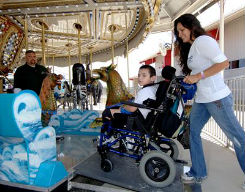 Amusement Parks and Boating
Amusement Parks and Boating
In general, facilities like amusement parks and recreational boating are required to have accessible routes to loading and unloading areas as well as wheelchair accessible seating (or seating to accommodate a transfer from a wheelchair as well as a mechanism for transfer) based on design of the facility.
Golf and Mini Golf Courses
 For facilities like mini-golf courses, the rules require that at least 50% of the holes be accessible and that those holes should be consecutive with accessible entrances and exits.
For public golf courses, golf carts and accessible routes must be available. It is important to know that these rules may not apply to private clubs.
For facilities like mini-golf courses, the rules require that at least 50% of the holes be accessible and that those holes should be consecutive with accessible entrances and exits.
For public golf courses, golf carts and accessible routes must be available. It is important to know that these rules may not apply to private clubs.
Bowling Alleys
For bowling alleys, at least 5% of the lanes need to be served by an accessible route.Swimming Pools
 For swimming pools, wading pools and spas, at least two accessible means of entry need to be provided (for pools under 300 feet long, only one entry needs to be provided). This includes the option to use swimming pool lifts, sloped entries, transfer walls, transfer systems or pool stairs. For wave pools, lazy rivers, and sand bottom pools, only one accessible entrance needs to be provided.
For swimming pools, wading pools and spas, at least two accessible means of entry need to be provided (for pools under 300 feet long, only one entry needs to be provided). This includes the option to use swimming pool lifts, sloped entries, transfer walls, transfer systems or pool stairs. For wave pools, lazy rivers, and sand bottom pools, only one accessible entrance needs to be provided.
Stadiums/Ball Parks
 Wheelchair accessible seating is required for at least 1% of the total seats in a stadium or arena. Wheelchair accessible seating also must be integrated into the regular seating plan and should have comparable views to the field or stage (this includes providing an area where someone in a wheelchair can reasonably see over spectators who might be standing).
In addition to the wheelchair accessible seating, accessible restrooms and concession areas, at least 1% of the fixed seats must have no armrest (or a removable armrest) for those with mobility issues who do not wish to use the wheelchair accessible seating area.
Wheelchair accessible seating is required for at least 1% of the total seats in a stadium or arena. Wheelchair accessible seating also must be integrated into the regular seating plan and should have comparable views to the field or stage (this includes providing an area where someone in a wheelchair can reasonably see over spectators who might be standing).
In addition to the wheelchair accessible seating, accessible restrooms and concession areas, at least 1% of the fixed seats must have no armrest (or a removable armrest) for those with mobility issues who do not wish to use the wheelchair accessible seating area.
Beaches and Other Outdoor Areas
 Outdoor areas include places for camping, picnics, trails, and beach access routes. In general and when feasible, outdoor areas need to be accessible. At least 50% of picnic tables, fire rings, grills, and benches in an area are required to be accessible. However, of those 50%, only 40% of those areas are required to have an accessible route. There are exceptions when the trail or beach access has natural obstacles that make it impossible to comply with the regulations.
Outdoor areas include places for camping, picnics, trails, and beach access routes. In general and when feasible, outdoor areas need to be accessible. At least 50% of picnic tables, fire rings, grills, and benches in an area are required to be accessible. However, of those 50%, only 40% of those areas are required to have an accessible route. There are exceptions when the trail or beach access has natural obstacles that make it impossible to comply with the regulations.


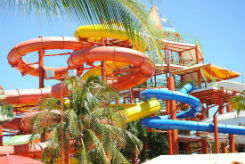 Water Slides
Water Slides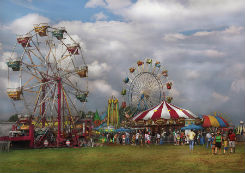 Mobile or portable amusement rides
Mobile or portable amusement rides
